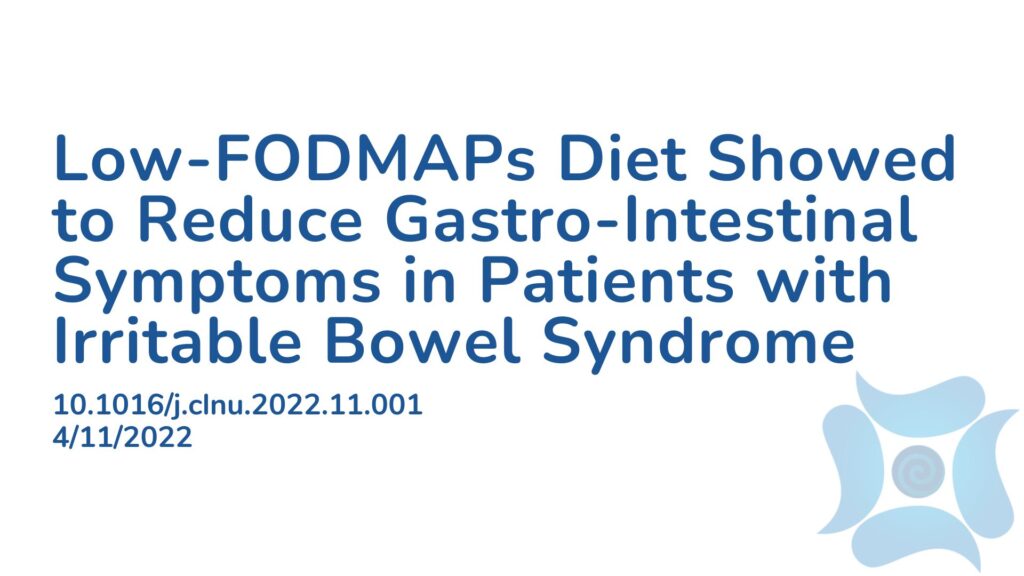Summary:
Irritable bowel syndrome (IBS) is a common disorder of the gastro-intestinal system, with a prevalence of 4%. It is characterized by abdominal pain and bowel habits that fluctuate between constipation and/or diarrhea. The cause is multifactorial and not completely understood. The link between food intolerances and IBS is well established and as a result, many patients follow an exclusion diet where specific foods are eliminated. One of the most common dietary interventions for IBS is following the low-FODMAP (fermentable oligosaccharides, disaccharides, monosaccharides, and polyols) diet, which are carbohydrates that are poorly digested and found in many food items such as legumes, dairy products, grains, fruits and vegetables. The aim of this study was to perform a double-blind, randomized controlled trial to look at the effects of a low versus moderate FODMAP containing diet and its role in gastro-intestinal symptoms seen in IBS. The study also looked at the role of these diets on psychological symptoms. The results showed that a low-FODMAPs diet reduces gastro-intestinal symptoms compared with a moderate FODMAP diet.
Abstract:
Background and aims: Fermentable oligo-, di-, monosaccharides and polyols (FODMAPs) can provoke symptoms in patients with irritable bowel syndrome (IBS). We aimed to compare the effects of diets with low vs. moderate FODMAP content on gastrointestinal (GI) symptoms and bowel habits, and to identify possible predictors of clinical response to a low FODMAP diet and FODMAP sensitivity in IBS. Methods: Adult participants with IBS (Rome IV criteria, n=29) were included and adhered to two 7-day diet periods, with either low (4g/day) or moderate (23g/day) amounts of FODMAPs, in this randomized, double-blind, crossover study. The periods were separated by a wash-out period (≥14 days). IBS-Severity Scoring System (IBS-SSS) and a stool diary (Bristol Stool Form) were completed before and after the diet periods. At baseline, severity of GI symptoms and gut microbial fermentation were assessed (every 15min, 4h) during the Lactulose Nutrient Challenge Test (LNCT). Clinical response and FODMAP sensitivity were defined by reduction after low FODMAP period, and increase after moderate FODMAP period in IBS-SSS (≥50 points), respectively. Results: Severity of GI symptoms (P=0.04), stool consistency (P=0.01), and stool frequency (P=0.01) differed between the interventions, with reduced overall GI symptom severity, abdominal pain intensity and frequency, bowel habits dissatisfaction, and daily life interference (P<0.05 for all), as well as more firm (P=0.03) and less frequent (P<0.01) stools after low FODMAP intervention, but not after moderate FODMAP intervention. A third (34%) responded clinically to the low FODMAP diet, and the response could be predicted by higher IBS-SSS at baseline (P=0.02). Although modest associations between FODMAP sensitivity (22%) and GI symptoms during LNCT were observed, no independent predictors could be identified. Conclusions: A diet low in FODMAPs reduces GI symptoms and affects bowel habits in IBS, compared with a moderate FODMAP diet. Assessment of IBS severity before the intervention may be used to predict clinical response to a low FODMAP diet.
Article Publication Date: 4/11/2022
DOI: 10.1016/j.clnu.2022.11.001




